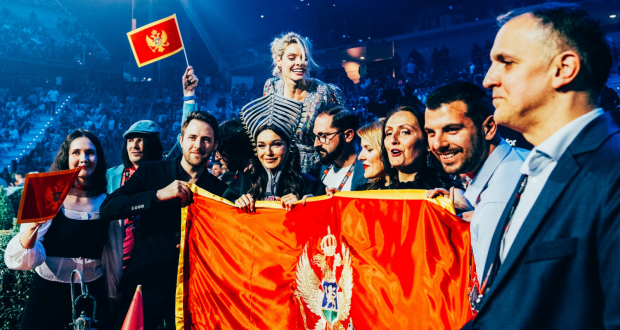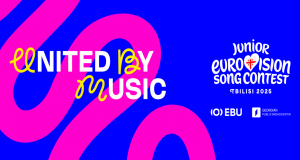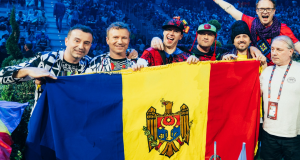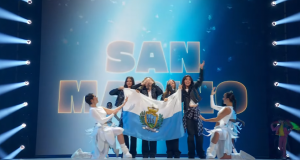Following a turbulent Eurovision season marked by controversies surrounding the national selection Montesong and a disappointing result in Basel, the Montenegrin public broadcaster RTCG has confirmed its participation in Eurovision 2026 in Vienna.
While this news has delighted fans, the debate about financial and organizational challenges is still in full swing.
At a recent RTCG meeting, Eurovision participation was the subject of a fierce discussion. Although opinions within the council were divided, the general director of RTCG, Boris Raonić, was clear and determined.
„Montenegro’s participation in Eurovision is not in question“, said Raonić. However, the method of selecting the representative remains uncertain and will be directly tied to the budget. Raonić emphasized that the Montenegrin Eurovision budget is up to ten times smaller compared to other public broadcasters, with half of the funding secured from sponsors. „Our budget for Eurovision is at least ten times smaller compared to other public broadcasters. At least half of the funding comes from sponsors“, he added.
While council member Marijana Camović Veličković stated that it is „pointless spending money“, also criticizing last year’s Montesong, Janko Ljumović highlighted that „taking part in European events is extremely important for a country“. He added, „It is obvious that Eurovision is organized in such a way that public broadcasters are the producers of the Contest… I believe that regardless of all the trends, our absence from the Contest is a loss we cannot afford“. Despite the varied opinions, a rulebook concerning the selection of the representative was voted on at the meeting, though its details are not yet known to the public.
Representative of Montenegro at the Eurovision Song Contest 2025 in Basel
Montesong 2024: Controversies, withdrawal, and the worst result in history
Last year’s Montesong, designed in collaboration with the Association of Variety Performers of Montenegro, was intended to bring a new sparkle to the Montenegrin selection process. Instead, it was marked by a series of events that led to ultimate chaos.
The winning group Neonoen with the song „Clickbait“ had to withdraw from the competition after it was discovered that the track had been publicly performed before the deadline set by the Eurovision rules. In an effort to end the uncertainty, the band voluntarily withdrew.
Following this, the runner-up, Nina Žižić, with the song „Dobrodošli“, was chosen to represent Montenegro in Basel. Although her song was revamped, the result was disappointing. Nina Žižić finished last, in 16th place in the second semi-final, scoring only 12 points, all from Serbia.
This also marks the worst result in Montenegro’s history of independent participation in Eurovision, as it was the first time Montenegro finished last in its semi-final. Additionally, the entire Montesong event was heavily criticized for its poor organization, and the host, Vladana Vučinić, a former Montenegrin representative, resigned, citing a lack of transparency.
Winners of Montesong in 2024
Montenegro at Eurovision
Montenegro has a long and complex Eurovision history. Before gaining independence, it participated as part of Yugoslavia and later Serbia and Montenegro. In those periods, Montenegrin representatives achieved notable results, such as a 4th place with Danijel Popović in 1983 or a 7th place with No Name in 2005.
However, since 2007, when it began competing independently, the journey has been much more challenging. The first qualification for the final occurred only in 2014 with Sergej Ćetković and his song „Moj svijet“ and a year later, Knez achieved the best result to date, 13th place with the song „Adio“.
Despite these two successful entries, a series of unsuccessful attempts followed. From 2016 to the present, Montenegro has failed to qualify for the final. Financial problems and poor results have often led to temporary withdrawals, causing the country to miss the contests in 2010 and 2011, and then again in 2020, 2021, 2023, and 2024.
The latest attempts, including an internal selection in 2022 and the return of the Montesong national final in 2024, have failed to break the streak of bad luck. The poor result from Basel, where Nina Žižić took last place in the semi-final, further intensified public and expert criticism.
Given all the challenges and financial obstacles of the past year, it remains to be seen whether the Montenegrin public broadcaster will manage to find the right path for Eurovision 2026 and if the same problems will reoccur. As financial challenges persist, the question arises whether Montenegro, with its modest budget and poor results, should take a longer break from the competition to reorganize its approach. On the other hand, proponents of participation emphasize that Eurovision is a crucial platform for promoting the country and its artists, a loss that cannot be afforded.
Can Montenegro find a balance between ambition and realistic capabilities and finally turn the tide of failure on Europe’s biggest music stage?
Representative of Yugoslavia at the 1983 Eurovision Song Contest in Munich
 OGAE Serbia :: Vaš evrovizijski svet
OGAE Serbia :: Vaš evrovizijski svet



